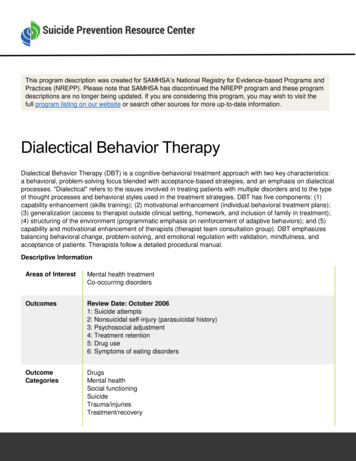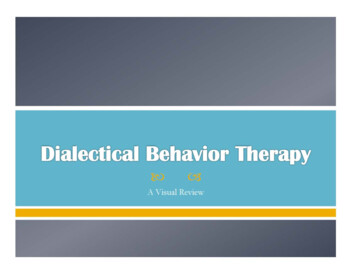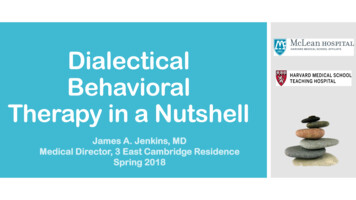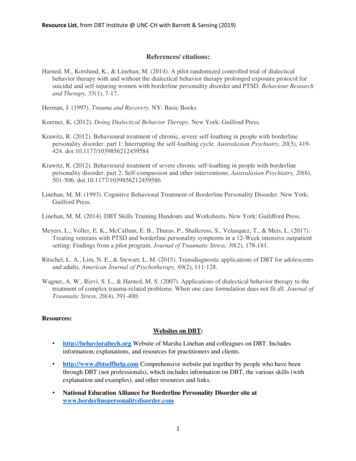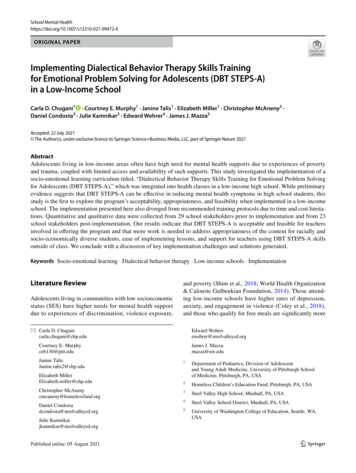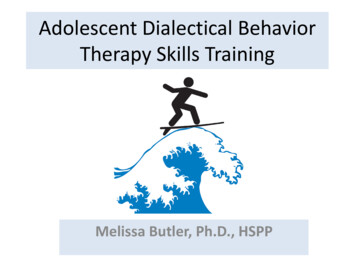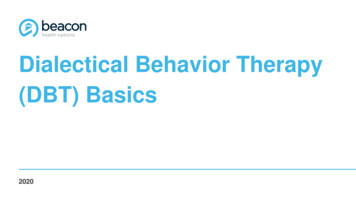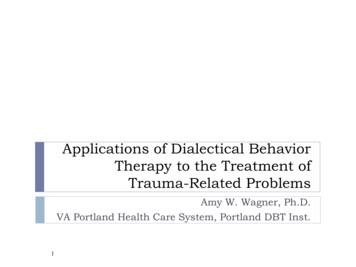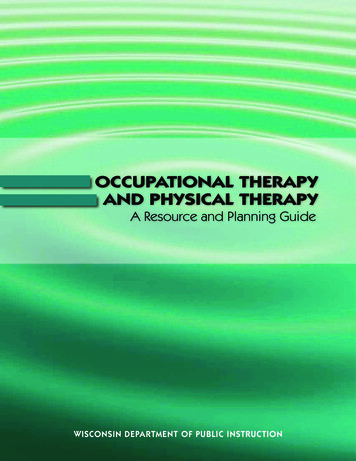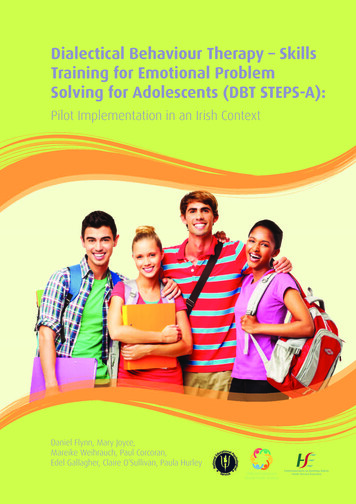
Transcription
Dialectical Behaviour Therapy – SkillsTraining for Emotional ProblemSolving for Adolescents (DBT STEPS-A):Pilot Implementation in an Irish ContextDaniel Flynn, Mary Joyce,Mareike Weihrauch, Paul Corcoran,Edel Gallagher, Claire O’Sullivan, Paula HurleyChild and AdolescentMental Health Services
DBT STEPS-A: Pilot Implementation in an Irish contextForewordConnecting for Life, Ireland’s National Strategy to Reduce Suicide 2015-2020, sets out a vision for Irelandwhere fewer lives are lost through suicide, and where communities and individuals are empowered toimprove their mental health and wellbeing. Evidence shows that no single intervention alone will preventsuicide. It is the collective impact of a number of strategies in place at a population based, communitybased and individual level. The Connecting for Life strategy brings together 12 key elements across sevenstrategic goals which collectively are proven to help reduce suicide.Youth are identified as a priority group within the strategy. We know that early intervention and promotionof positive mental health in schools is key to improving understanding of, and attitudes to suicidal behaviour,mental health and wellbeing; as well as to building resilience. The skills that adolescents learn in schoolare the foundation stone for their future; academically, vocationally, socially and emotionally. Internationalresearch highlights the value of whole school approaches which are supported by the wider communityincluding our health services. Effective inter-agency systems help young people to learn skills that assistthem in understanding and managing their mental health, as well as accessing relevant mental healthservices as required.One of the objectives of Goal Four of Connecting for Life is to improve access to effective therapeuticinterventions for people vulnerable to suicide. We are proud to have supported the pilot implementationof Dialectical Behaviour Therapy – Skills Training for Emotional Problem Solving for Adolescents (DBT STEPSA) in Cork, as part of this objective. This pilot programme demonstrates how the education system andhealth service can work in partnership to assist young people in both understanding and managing theirmental wellbeing. The initiative gives us an appreciation of the challenges we face in implementing newapproaches and how we need to both adopt and adapt such programmes so they work in an Irish context.Gerry RaleighDirectorNational Office for Suicide Prevention1
DBT STEPS-A: Pilot Implementation in an Irish contextContentsAcronyms .3Acknowledgements .4Executive Summary .5Recommendations .7Background .8Adolescent Mental Health Issues in Context .8Schools Based Intervention Programmes .11Evidence Based Mental Health Programmes in Schools in Ireland .12Youth Aware of Mental Health .12MindOut .12Conclusion .13Unmet Need: A New Systems Approach .13Dialectical Behaviour Therapy - Skills Training for Emotional Problem Solvingfor Adolescents (DBT STEPS-A) .14Curriculum Overview .15DBT STEPS-A for an Irish School Setting .16Origins of Project Proposal .16Evaluation of DBT STEPS-A in Ireland .19Study Setting .19Study Design .20Participants .21Measures .21Procedure .22Risk Assessment .23Ethics .23Data Analyses .23Results .24Missing Data .25Baseline Scores on Outcome Measures .25Change in Outcome Measures from T1 to T4 .27Summary of Findings on Outcome Measures .30Student Survey Feedback .30Teacher Survey Feedback .32Network Meetings .32Areas for Improvement/Reflections .33Discussion .34Interpretation of Results .34Sampling Issues .35Key Implementation Challenges .36System Implementation .36Programme Structure and Content .37Training .37Time for Preparation and Delivery .37Programme Materials .38Programme Structure .38Engaging Parents .39Conclusion .39References .402
DBT STEPS-A: Pilot Implementation in an Irish contextAcronymsBASC-2The Second Edition of Behaviour Assessment System for ChildrenCAMHSChild and Adolescent Mental Health ServicesDBTDialectical Behaviour TherapyDBT STEPS-ADialectical Behaviour Therapy Skills Training for Emotional Problem Solving forAdolescentsHSEHealth Service ExecutiveNEPSNational Educational Psychological ServiceNOSPNational Office for Suicide PreventionSEALSocial and Emotional Aspects of LearningSPHESocial, Personal and Health EducationYAMYouth Aware of Mental Health3
DBT STEPS-A: Pilot Implementation in an Irish contextAcknowledgementsWe would like to begin by thanking the National Office for Suicide Prevention (NOSP) who provided fundingto train multi-agency staff in the DBT STEPS-A programme and who provided resources to support theevaluation of the pilot implementation in Ireland.We also wish to acknowledge: The school staff and principals who recognised the need to enhance the mental health education ofstudents in their schools and agreed to support both the pilot implementation and evaluation of theprogramme. We are conscious of the additional demands on time that this placed on both individualsand school systems. The staff in the National Educational Psychology Service, both school Educational Psychologists andsenior management. Staff from the Health Service Executive (Child and Adolescent Mental Health Services and HealthPromotion) who supported the schools through multi-agency networking and consultation as required. The research support of staff in the National DBT Project office.Finally, we wish to thank the students in Cork schools who participated in the DBT STEPS-A programme andcompleted questionnaires and surveys which assisted with the evaluation of this programme in an Irishcontext. It would not be possible to understand the potential merits of such programmes or to be able torefine them for future students without their considered inputs.4
DBT STEPS-A: Pilot Implementation in an Irish contextExecutive SummaryIreland, like many other countries, has noted increasing levels of psychological distress in school agedpopulations in recent years. Although there has been some focus on causal factors internationally, thechallenge is how to address this trend, particularly in the senior school cycle.In Ireland, there are continued concerns about the emotional resilience of the adolescent population:maladaptive coping mechanisms such as self-harm peak for males and females under 24 years of age.Research on best practice in national and international policy documents highlight the importance ofpromoting mental health in schools. There is a particular focus on whole school approaches where socialand emotional learning curricula target the universal population and where children with identified needs(either at risk or experiencing significant mental health problems) can be supported though communityservices. Strong multi-agency partnerships are required to ensure that the appropriate levels of mentalhealth education and intervention are delivered as needed and in a timely manner to best meet the needsof the young person and their family.There are few examples of universal programmes that address the needs of Irish adolescents in secondaryschool senior cycle. Dialectical Behaviour Therapy – Skills Training for Emotional Problem Solving forAdolescents (DBT STEPS-A) is a universal social and emotional learning programme that was developed inthe United States. Although the DBT STEPS-A programme was developed outside of Ireland, the contenthas broad based applicability and can be applied across the secondary school system.This programme was piloted in eight schools in Cork city and county. It was delivered by teachers and wassupported by multi-agency partners in the National Education Psychology Service and the Health ServiceExecutive (Child and Adolescent Mental Health Service and Health Promotion) in delivery and evaluation ofthe programme. The participating schools worked in local multi-disciplinary networks which supported theteachers in understanding and teaching the programme, and also facilitated escalation of levels ofintervention as required to meet individual student need with the support of community health services.Given the variation in schools’ gender mix and socio-demographic status, and the amount of the programmedelivered in each school, it was not possible to pool the data from the eight schools. A subsample of thedata was used to evaluate the effectiveness of the programme by matching a school that completed theDBT STEPS-A programme with a control school where there was no intervention. Standardised measureswere used to assess change in mental wellbeing from beginning to end of academic year for both schools.It was found that students in the DBT STEPS-A school had significantly lower scores on constructs such asdepression, anxiety and social stress in comparison to the control school at the end of the academic year.5
DBT STEPS-A: Pilot Implementation in an Irish contextData on the implementation of the programme from a teacher’s perspective and on its utility from a studentperspective was gathered via surveys. Although there were a number of challenges with adapting theprogramme for an Irish context, teachers were generally positive about the contents and its value forstudents. Equally, student feedback highlighted the importance of incorporating a mental health, social andemotional learning curriculum into their education. Student feedback offered useful suggestions on howthe programme could be refined to better meet their needs.DBT STEPS-A shows promise as an effective universal mental health education programme that could beadapted and refined to increase its utility in the Irish education system. It fits with international best practiceguidelines and national policy on promoting mental wellbeing in schools. It offers a multi-agency partnershipapproach to supporting mental wellbeing in schools. Funding support will be required to optimise theprogramme content and adapt it for Irish schools. Future research will be required to evaluate theadaptations with larger samples and across geographic regions.6
DBT STEPS-A: Pilot Implementation in an Irish contextRecommendations1.Given the current challenges to the psychological health of adolescents in Ireland, mental health andwellbeing education, particularly at senior cycle, needs to be prioritised in Irish schools.2.Multi-agency funding is required to foster the ability of educational, health and community servicesto train and work together to develop and enhance a mental health programme for young peoplewhich channels extra support for ‘at risk’ adolescents as necessary.3.Given the tentative findings which demonstrate the potential benefits of the DBT STEPS-A programme,the contents of the programme should be refined to better fit the Irish school system structure bytaking into account the feedback provided by teachers and students. This will include: Reducing lessons plans to 40 minutes instead of the 50 minute class used in the United States Changing the order of the presentation of the materials; focusing first on mindfulness, thenemotion regulation, interpersonal effectiveness and distress tolerance skills Incorporating more multimedia and opportunities for interactive learning and to consider doubleclass periods to have enough time for lesson content Running the programme over the full senior cycle (i.e. introduction in transition year and weeklyclasses in 5th and 6th year to consolidate learning by engaging in more experiential practice).4.Schools will need to incorporate DBT STEPS-A in the class timetable to ensure that students have theopportunity to cover the full content of the programme over the course of the senior cycle, thusmaximising its potential benefit.5.Teachers will need system support to train for the delivery of DBT STEPS-A where time is allocated forthem to enhance their skills and avail of supervision and guidance as required.6.Facilities should be made available for community partner agencies (NEPS, CAMHS and HealthPromotion staff or voluntary agencies) to co-facilitate teaching sessions to enhance the student’sexperience of the programme.7.Consideration will need to be given for how to best engage parents in understanding and supportingtheir child’s mental health and wellbeing. This will require further evaluation where information isgathered from parents about their needs and also for the development of materials, to be deliveredin vivo or via multimedia.8.Further research should be conducted to explore the effectiveness of a modified version of DBT STEPSA in the Irish secondary school senior cycle.7
DBT STEPS-A: Pilot Implementation in an Irish contextBackgroundIn Ireland, in 2017, like many other developed countries, young people are faced with increased pressuresin their daily lives from a range of sources including social media, societal, peer and academic pressure.Such challenges have led to increasing levels of stress, with corresponding impacts on parents, educatorsand professionals who struggle to respond effectively.Adolescent Mental Health Issues in ContextIn the past two decades, there has been an increased focus on the exploration of mental health issues inadolescents. For example, a study conducted in 2006 reported that the prevalence of anxiety and depressionin adolescents were 3.7% and 4.5% respectively (Lynch, Mills, Daly & Fitzpatrick, 2006). Following on fromthis, research conducted by Headstrong and reported in the My World Survey (Dooley & Fitzgerald, 2012)highlighted that up to 70% of health problems and most mortality among the young arise as a result ofmental health and substance-use disorders. According to this report, mental disorders account for a largeproportion of the disease burden in young people in all societies with 75% of all mental disorders firstemerging between the ages of 15 and 25. Almost a third of the sample (adolescents aged 12-19 years)reported depression and anxiety in clinical ranges (30% and 32% respectively). The report also noted thatlevels of distress were likely to increase with the age of the adolescent, and those who reported beingdistressed were more likely to use alcohol problematically and have experienced bullying (Dooley &Fitzgerald, 2012).Further evidence of these trends have been highlighted in a recent UNICEF report (UNICEF Office of Research,2017) stating that 22.6% of Irish children aged 11-15 years experience two or more psychological symptomsmore than once a week. According to this report, Ireland ranks 16th of 31 countries with regard to reportsof adolescent mental health issues (such as feeling low, irritability, feeling nervous and experiencing sleepdifficulties). These rates have increased for Irish adolescents since previous surveys in 2006 and 2010 (seefigure 1).8
DBT STEPS-A: Pilot Implementation in an Irish contextFigure 1 – Summary of adolescent reported psychological symptoms by country (reproduced fromUNICEF Office of Research 2017)In the absence of more adaptive coping mechanisms, self-harm (e.g. cutting, overdose) is sometimes usedas a means of dealing with psychological distress. In Ireland, over the past number of years, there havebeen increases in self-harm rates for young people. In 2014, a study which explored data collected fromthe National Self-Harm Registry Ireland with data from the Child and Adolescent Self-harm in Europe studyfound that many young people reported self-harm (with a rate of 5,551 per 100,000 per year). It was alsofound that only 6% of young people who reported episodes of self-harm presented to hospital. For youngpeople who did attend hospital following a self-harm episode, the peak age rate for females was 16 years,and 19 years for males (see figure 2; Griffin et al., 2015).9
DBT STEPS-A: Pilot Implementation in an Irish contextFigure 2 – Person-based rate of self-harm in the Republic of Ireland in 2014 by single year of agefor 10-24 year-oldsRelated to the issue of self-harm, a growing concern in Ireland is the high rate of suicide in adolescents.Ireland is ranked fourth highest in the EU/OECD region for suicide in adolescents.In addition to the statistics regarding self-harm and suicide reported here, mental health challengesexperienced by youth in Ireland have also been observed by teachers and mental health professionals.More specifically, teacher observations have identified increased maladaptive behaviours (e.g. cutting) andpoor emotional control which results in the need for greater levels of engagement with the NationalEducation Psychology Service (NEPS), and an increase in the number of referral to specialist services suchas Child and Adolescent Mental Health Services (CAMHS). Schools have a growing awareness of positivemental health and its importance in the lives of their students, given the development of both internationaland national best practice guidelines (Weare, 2015; Department of Education & Skills, 2013).In response to the outlined increase in psychological stress, one of the key concerns for Irish society isidentifying how to support young people in regulating their emotions to avoid the need to resort to moreextreme behaviours in attempts to numb or escape emotional distress. Current research supports the theorythat the vast proportion of psychopathological changes have their onset in childhood and adolescence, andtherefore young people are an especially important target for stakeholders concerned with reducing selfharm and suicidal behaviours (Werner-Seidler, Perry, Calear, Newby & Christensen, 2017). With this in mind,there is now multi-agency awareness of the need to provide a universal early intervention which fostersemotional resilience, resulting in more positive coping strategies and greater capacity for emotion regulation.10
DBT STEPS-A: Pilot Implementation in an Irish contextSchools Based Intervention ProgrammesThe school environment is often identified as an appropriate setting for accessing young people wherepreventative skills against future problems can be taught to the general school body and ‘at risk’ childrencan be identified for more specialised intervention or onward referral (Browne, Gaffni, Roberts, Byrne &Majumdar, 2004; Werner-Seidler et al., 2017). Using a school based system as the context forimplementation of a prevention programme for mental health issues provides a natural and accessible wayto reach young people. This environment provides unparalleled access to young people, offering anopportunity to learn skills and strategies to protect against, buffer or delay the onset of emotional difficulties.Such integrated schools programmes can also assist in removing some of the barriers that may restrictaccess to intervention such as time, location and in some cases cost (Werner-Seidler et al., 2017).Although there is general consensus by international researchers that intervention should be done at aschool level, there are divergent views on how this should be done and by whom (Fazel, Hoagwood,Stephan & Ford, 2014). Research (e.g. Werner-Seidler et al., 2017) highlights that schools-based mentalhealth programmes may be universal, targeted or indicated. Universal prevention programmes are generallydelivered on a wide scale to all young people in a class, regardless of risk. This approach offers a broaderinstructional framework and reaches a much wider population. Such programmes are often favoured asthey are low cost, are least intrusive and are most likely to have the greatest chance of adoption in theschool context; however they require sustained effort by the system.Targeted programmes work specifically with young people who have been pre-identified as ‘at risk’. Assuch, these programmes can be more specific and intensive. There is a strong research evidence base forthese programmes (Fazel et al., 2014). Indicated programmes however, are aimed specifically at childrenwith already manifest signs of mental health problems. In a recent systematic review, universal approacheswere noted to account for over half of the studies, one third were indicated intervention and the remainderwere selected interventions (Werner-Seidler et al., 2017).There is a lack of consensus as to which is the more effective approach, with a need for schools and healthpromotion agencies to consider the best fit for their educational and health systems when choosing anappropriate intervention (Clarke & Barry, 2010, Fazel et al., 2014). However, evidence suggests thatprevention programmes are successful across a range of domains. Prevention programmes have been seento prevent or delay the onset of clinically significant symptoms, reduce harmful behaviour and work as aprotective factor against future difficulties; it follows that prevention programmes often have secondarybenefits in terms of societal burden and budgetary incentives by reducing future levels of the need toengage with mental health services and reducing future mental health related disability (Werner-Seidler etal., 2017). There are multiple examples of such programmes internationally such as Mind Matters inAustralia, Friends for Life (7-16 years) in multiple countries (e.g. New Zealand, Canada, Finland) and theSocial and Emotional Aspects of Learning (SEAL) programme in the United Kingdom (Library & ResearchService, 2012).11
DBT STEPS-A: Pilot Implementation in an Irish contextThere has been a growing focus on well-being and promoting mental health in schools. The past twodecades have seen an increase in the development of social, personal and health education (SPHE),particularly in the junior cycle. Although a positive development, such advancements are not withoutchallenges. Implementation reports have highlighted issues regarding training, resources, timetablingpressures, and less priority being given to the value of such programmes in comparison to academic examsubjects (O’Higgins et al., 2013). In 2013, a multi-agency report was produced by the Departments ofHealth and Education, the National Educational Psychology Service and HSE Health Promotion. This report(The Wellbeing in Post Primary Schools Guidelines for Health Promotion and Suicide Prevention, 2013)recommends that Irish schools adopt a whole school approach to mental health, involving a holisticintegrated approach where schools and community partners work together to support positive mentalhealth for young people. It recommends support for all, support for some and support for few, which is atiered system where input increases in line with the needs of the young person. The report also highlightsthat all students need to learn emotional resilience skills but few may need intensive intervention for moredefined mental health issues. Finally, the report outlines that mental health and wellbeing are not the soleresponsibility of the school; parents and the wider community including health services have a role to playin supporting youth mental health and wellbeing.Evidence Based Mental Health Programmes in Schools in IrelandTo our knowledge, there are two programmes with a focus on supporting youth mental health that havebeen implemented and evaluated in Irish educational settings for students in the senior cycle.Youth Aware of Mental HealthYouth Aware of Mental Health (YAM) is a programme for 14-17 year olds that promotes increased mentalhealth knowledge through dialogue and play (Youth Aware of Mental Health, 2014). The YAM programme(4 sessions totaling 5 hours) is taught by an external facilitator rather than teachers from within the students’school. The initial version was evaluated in 168 schools across ten European Union countries (includingIreland; Wasserman et al., 2015). The programme was associated with a significantly lower number ofsubsequent suicide attempts and suicidal ideation compared to the control group.MindOutIn contrast to the YAM programme, MindOut is a school-based programme which is delivered by teacherswithin the school rather than an external provider. MindOut, originally a ten session Mental Healthprogramme, takes a positive approach to the promotion of emotional and mental health among youngpeople. It was developed in consultation with teachers, students and health promotion
Dialectical Behaviour Therapy – Skills Training for Emotional Problem Solving for Adolescents (DBT STEPS-A) is a universal social and emotional learning programme that was developed in the United States. Although the DBT STEPS-
